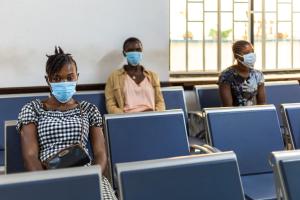Advancing leadership for women's health and sexual and reproductive health and rights in the African region
Lusaka - Ministers of Health and Heads of Delegation from Member States attended a high-level meeting, titled "Advancing Leadership for Women's Health and SRHR in the WHO African Region", as part of the 75th Session of the Regional Committee of the WHO African Region. Dr. Abdourahmane Diallo, Director of Programme Management, representing the WHO Africa Regional Director, Dr Mohamed Janabi. chaired the meeting with countries participating in the Sexual and Reproductive Health and Rights (SRHR) Initiative. Dr. Diallo commended the Ministers of Health for their dedication and efforts to promote SRHR. He also expressed appreciation to the large anonymous donor, whose support has been instrumental in promoting government-led strategies and in building resilient health systems capable of delivering equitable SRHR services through primary healthcare.
“This initiative shows what is possible when governments lead with vision and determination” said Dr. Abdourahmane Diallo, Director of Programme Management at WHO Regional Office for Africa. “The leadership of African Ministers of Health is the most critical determinant of progress for women’s health and rights in our Region.”
Over the past twenty years, the WHO African Region has witnessed remarkable progress towards global benchmarks in women’s health and sexual and reproductive health and rights (SRHR). The maternal mortality ratio has dropped markedly, from 727 to 442 deaths per 100,000 live births, between 2000 and 2023. Ten Member States have achieved the national benchmark of fewer than 140 maternal deaths per 100,000 live births, in accordance with the “Every Woman, Every Newborn Everywhere” (EWENE) initiative. Furthermore, the proportion of births attended by skilled health personnel now exceeds 80% in 28 countries, a significant increase from 13% in 2010. Access to modern contraception is expanding, and adolescent birth rates have fallen below 100 per 1,000 girls aged 15–19 for the first time. Incidents of intimate partner violence are also on the decline.
“We are witnessing real change on the ground, more women surviving childbirth, more women accessing family planning, and stronger health systems,” noted Dr Mohamed Janabi, WHO Regional Director for Africa. “But we must act with urgency. Every preventable maternal death is one too many.”
These advancements are a result of strong leadership, significant investment, and effective partnerships, including the generous support of a large anonymous donor, marking the largest investment in SRHR in the region’s history. To date, this initiative has expanded access to high-quality, integrated, people-centred SRHR services in 18 countries, including in conflict and emergency settings. Specifically, the initiative contributed by organising 234 community sensitisation events, training over 8,800 healthcare professionals, and strengthening 579 health centres in services aimed at reducing maternal mortality due to unsafe abortion. It also trained 8,200 community health workers in modern contraception methods. Essential Medicines Lists were updated in ten countries to include medicines for abortion care, and self-care interventions for SRHR were introduced or expanded in 303 districts. This led to more than 1.1 million additional women across nine countries gaining access to modern family planning methods.
“Our country is committed to breaking the cycle of child marriage and adolescent pregnancy . We will continue to enact laws and policies that protect the rights and futures of women and girls.” Dr Austin Demby, Minister of Health, Sierra Leone.
Despite progress, challenges remain. The African Region accounts for over 70% of global maternal deaths, underscoring the urgent need to accelerate progress towards the Sustainable Development Goals (SDGs) targets for maternal mortality reduction, with unsafe abortion still a major factor. Restrictive laws, high adolescent birth rates of 97 per 1,000, and child marriage hinder health outcomes and gender equality. Addressing these persistent challenges is crucial for achieving universal access to quality SRHR services. A session led by Dr. Adelheid Onyango, Acting Director for the Health Systems and Services Cluster at the WHO African Region, facilitated the sharing of insights on SRHR programme implementation, best practices, and the need for ongoing support from WHO and donors to expand access, especially as global funding changes.
Ministers of Health and Heads of Delegation expressed appreciation to WHO and the donor for the financial and technical support through the grant in response to country priorities, which has significantly improved SRHR outcomes and strengthened health systems. They noted the advances in legal and regulatory frameworks, including laws on adolescent pregnancy and increased access to contraception and family planning services, particularly in rural areas. The Initiative has also seen the implementation of national policies and service delivery guidelines for reproductive, maternal, newborn, child, and adolescent health, using a whole-of-government approach. Notable improvements to health infrastructure, such as the renovation of health facilities and the procurement of ambulances, have also expanded access to essential services.
In conclusion, Dr. Diallo appreciated the political leadership and commitment shown by Honourable Ministers, recognising it as the most critical factor in achieving our shared goal for women’s health and well-being. He emphasised that continued investment in women’s health, as well as sexual and reproductive health and rights, is crucial for building on the progress made so far. He noted that WHO advocates for stronger partnerships, effective legal frameworks, and improved health systems and infrastructure to ensure that equitable, high-quality SRHR services remain accessible to all women and girls across the WHO African Region, thereby ssafeguarding lasting SRHR outcomes and promoting gender equality.
Communications officer
WHO regional ofice for Africa
Email: ntaganiram [at] who.int (ntaganiram[at]who[dot]int)
Communications and marketing officer
Tel: + 242 06 520 65 65 (WhatsApp)
Email: boakyeagyemangc [at] who.int (boakyeagyemangc[at]who[dot]int)



